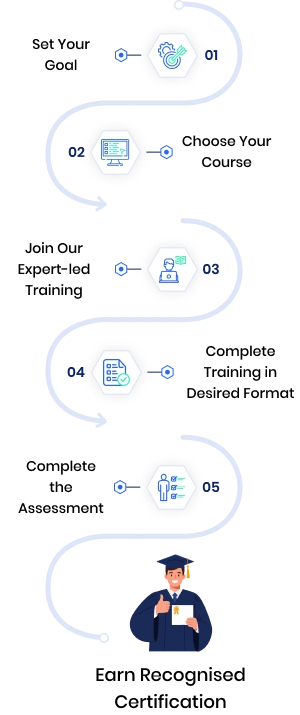Course Overview O v e r v i e w
- Course Overview
- Course Outline
- What’s Included
- What You’ll Learn
- Exam Details
ITIL® 4 Specialist: Sustainability in Digital and IT Training ITIL® SDIT Overview
The ITIL® SDIT Training Course focuses on embedding sustainability into digital and IT service management. It explores how organisations can align their IT strategies with environmental, social, and governance (ESG) principles while maintaining service excellence. Learners gain insights into sustainable business models, responsible decision-making, and the role of IT in driving long-term value creation.
Formal training in ITIL® SDIT equips professionals with the tools and frameworks needed to implement sustainability within IT operations effectively. It enhances strategic thinking, supports compliance with ESG standards, and improves stakeholder engagement. Certified individuals are better positioned to lead sustainable transformation initiatives and contribute to organisational resilience and ethical growth.
Training Deals offers a unique learning experience for ITIL® SDIT through expert-led sessions, flexible online formats, and access to up-to-date digital resources. Our course is designed to meet the evolving needs of sustainability-focused IT professionals, combining practical insights with globally recognised certification. With competitive pricing and dedicated learner support, Training Deals ensures you gain maximum value from your training investment.

ITIL® 4 Specialist: Sustainability in Digital and IT Training ITIL® SDIT Outline
Unit 1: Understand the Key Concepts of Sustainability
Module 1: Describe the Benefits of Sustainability for an Organisation
Benefits of Sustainability
Module 2: Describe the Key Concepts of Sustainability
What is Sustainability?
Sustainability Models, Issues, and Concepts
Module 3: Explain the Purpose of the UN Sustainable Development Goals and their role in an Organisation’s Sustainability
17 UN Sustainable Development Goals
Role of the UN SDGs for Sustainability Vision
Module 4: Explain the Purpose of the UN Global Compact Principles and their role in Organisations’ Sustainability
Ten Principles of the UN Global Compact
Module 5: Describe the Triple Bottom Line Model and the Scope of Each of the Three Pillars
Triple Bottom Line
Module 6: Describe the Concept of Externalities
Impact of Sustainability Initiatives
Module 7: Describe the Key Challenges of Sustainability
Growing Human Population
Waste Management
Greenhouse Gas Emission
Digital Poverty
Digital Carbon Footprint
Module 8: Describe the Key Sustainability Solutions
Corporate Social Responsibility
Responsible Sourcing
Sustainable Consumption and Production
Circular Economy
Unit 2: Understand the Value, Benefits, Costs, and Risks of Sustainability
Module 9: Describe the Purpose of a Materiality Assessment
Materiality Assessment
Why Conduct a Materiality Assessment?
How to Conduct a Materiality Assessment?
Materiality Assessment by DEFRA
Materiality Assessment Outputs
Module 10: Describe the Key Sources of Organisational Sustainability Risks
Sustainability Risk Assessment
Module 11: Describe the Key Organisation-Level Stakeholder Groups and their Expectations
Stakeholders
Module 12: Describe the Key Types and Sources of Sustainability Standards and Regulations
Regulations and Standards
Module 13: Explain the Role of Services and the Service Economy in Sustainability
Other Kinds of Sustainable Business Model
Approaches Supporting Sustainable Business Models
Module 14: Explain the Recommendations for Sustainability Return on Investment (ROI)/Value on Investment
Return on Investment in Sustainability
Unit 3: How Digital and Information Technology Support Sustainability
Module 15: Explain the Role of Digital Technology in Sustainability
Role of Technology in Sustainability
Digital Transformation for Sustainability
Sustainable IT
Module 16: Describe How Digital Technology Impacts Sustainability
Digital Sustainability
Unit 4: Know How to Plan Sustainability for an Organisation
Module 17: Explain the Role of Sustainability in an Organisation’s Vision
Business, Digital, and Sustainability Vision
Module 18: Describe the Key Due Diligence Considerations for Sustainability
Diligence Analysis
Module 19: Explain the Key Concerns of Achieving Sustainability in a Volatile, Uncertain, and Complex Environment
Principles-Based Approach Vs Procedures-Based Approach vs Model-Based Approach
Using Cynefin and Sense-Making to Address Complexity
Module 20: Describe the Three Dimensions (Aspects) of Strategic Planning
Sustainability Business Model
Evolution of Sustainability Planning
Sustainable Products and Services
Designing Sustainable Products and Services
Organisational Ecosystem
Module 21: Describe the Key Elements of an Organisational Sustainability Strategy
Strategies for Sustainability
Module 22: Describe the Key Elements of Sustainability Culture
Values and Culture
Module 23: Know How to Address Sustainability in an Organisation’s Vision
Defining the Vision
Triple Bottom Line for Vision
Unit 5: How Organisational Sustainability is Assessed, Maintained, and Improved
Module 24: Describe the Key Concepts of Measurement and Reporting
Metrics and KPIs
Common Sustainability Metrics
Module 25: Explain How the Following Support Sustainability
Innovations
Communication and Collaboration
Governance and Audit
Module 26: Explain How the Following ITIL Practices Support Sustainability
Organisational Change Management
Strategy Management
Software Development and Management
Supplier Management

What’s included in this ITIL® 4 Specialist: Sustainability in Digital and IT Training ITIL® SDIT?
- Expert-led Training Sessions by Certified Instructors
- ITIL® 4 Specialist: Sustainability in Digital and IT Training ITIL® SDIT Exam
- Digital Delegate Pack
What You’ll Learn in this Course
This course takes you from understanding the fundamentals of sustainability in IT to applying responsible practices across digital service management. Each module equips you with practical tools and insights to lead ESG-aligned initiatives confidently.
Learn how sustainability integrates with ITIL® 4 service value systems
Learn to assess and improve the environmental impact of IT services
Learn to align IT strategies with ESG goals and stakeholder expectations
Learn to embed sustainable thinking into decision-making and governance
Learn to apply ITIL® SDIT practices across various digital environments
Learn to drive long-term value through responsible IT service delivery

ITIL® 4 Specialist Sustainability in Digital and IT Training (ITIL® SDIT) Exam Information
The ITIL® 4 Specialist: Sustainability in Digital and IT (ITIL® SDIT) Exam evaluates your grasp of ITIL® 4 principles and practices, specifically in applying sustainability within digital and IT service environments.
- Question Type: Multiple Choice
- Total Questions: 35
- Total Marks: 35 Marks
- Pass Mark: 65% or 23/35 Marks
- Duration: 60 Minutes
- Type: Closed Book

Our Upcoming Batches
Thu 26 Feb 2026 - Fri 27 Feb 2026
Duration: 2 Days
Thu 16 Apr 2026 - Fri 17 Apr 2026
Duration: 2 Days
Thu 4 Jun 2026 - Fri 5 Jun 2026
Duration: 2 Days
Thu 30 Jul 2026 - Fri 31 Jul 2026
Duration: 2 Days
Wed 29 Apr 2026 - Thu 30 Apr 2026
Duration: 2 Days Nottingham
Wed 5 Aug 2026 - Thu 6 Aug 2026
Duration: 2 Days Nottingham
Wed 11 Nov 2026 - Thu 12 Nov 2026
Duration: 2 Days Nottingham
Wed 18 Mar 2026 - Thu 19 Mar 2026
Duration: 2 Days Birmingham
Request More Information

Corporate Training
Elevate your workforce with expert-led corporate training that enhances skills, boosts productivity, and aligns teams with your business goals.

Individuals Training
Unlock personal growth and sharpen professional skills with tailored training designed to build your confidence and career success.
Your Path to Professional Recognition
Our path is designed to guide you through each stage with clarity, support and practical learning, helping you achieve your goals with confidence.

Step Forward with Globally Recognised Certification
A recognised certification is more than a credential. It’s proof of your commitment to professional excellence, providing you with the credibility, confidence, and global reach to advance your career in exciting new directions.
Globally Certified Professionals Over Time
Career Growth
81%Certified professionals reported receiving a promotion after earning their certification.
Global Opportunities
89%Certified professionals experienced access to new career opportunities, including leadership roles and global positions.
Not able to find what you are looking for
Our experts will guide you to the right course from thousands worldwide: tailored to your goals.
Frequently Asked Questions
This course focuses on integrating sustainability principles into IT service management. It helps professionals understand how to align IT strategies with environmental, social, and governance (ESG) goals while maintaining service quality and business value.
The course is ideal for IT professionals, service managers, sustainability officers, and anyone involved in digital transformation who wants to embed responsible practices into IT operations.
There are no formal prerequisites for attending the ITIL® SDIT course. However, completing accredited training is required before sitting the exam.
The exam consists of 40 multiple-choice questions, with a pass mark of 65% (26 correct answers). It is a closed-book exam with a duration of 60 minutes.
You will learn how to assess and improve the sustainability of IT services, apply ESG principles within the ITIL® framework, and lead initiatives that promote long-term value and responsible service delivery.
What Our Customers Say About Us
 Matthew Sullivan
HR Business Partner
Matthew Sullivan
HR Business Partner
Our HR team registered for the Change Management Foundation & Practitioner Training Course, and it couldn’t have been more valuable. The team gained practical frameworks to guide employees smoothly through transitions with confidence.
 Olivia Barrett
Operations Manager
Olivia Barrett
Operations Manager
Our operations staff completed the Lean Six Sigma Green Belt Training Course, and it has been transformative. We can now identify inefficiencies quickly, and the tools we learned are already improving performance across the team.
 Benjamin Foster
Product Manager
Benjamin Foster
Product Manager
Our product team took part in the Agile Project Management Foundation & Practitioner (AgilePM®) Training Course, and the difference is remarkable. We’re now more adaptive, collaborative, and efficient in managing change.
 Lucy Harper
IT Support Lead
Lucy Harper
IT Support Lead
Our IT support unit attended the ITIL® 4 Foundation Training Course, and the results have been impressive. Processes are smoother, collaboration has improved, and the team finally speaks a common language of service management.
 Edward Clarke
Programme Manager
Edward Clarke
Programme Manager
We joined the PMP® Certification Training Course as a leadership group, and it was outstanding. The trainer made every concept practical, and the exam preparation resources helped the whole team feel ready to tackle complex projects.
 Amelia Rhodes
Project Officer
Amelia Rhodes
Project Officer
Our project office completed the PRINCE2® Foundation & Practitioner Training Course, and it has brought real clarity to how we manage projects. The trainer’s examples were excellent, and the team now follows a structured approach with confidence.

























